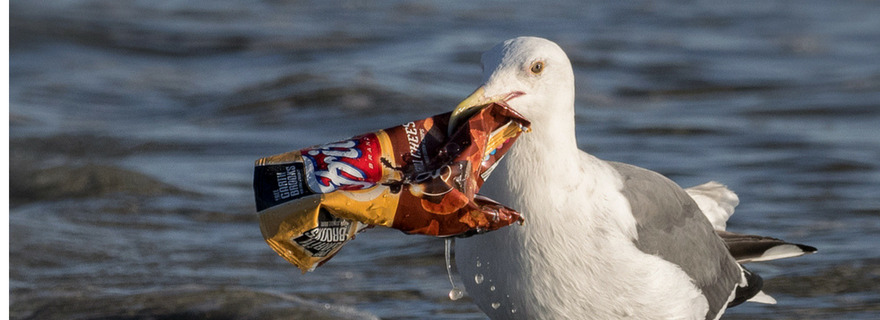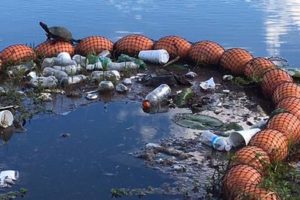
By Victoria Parsons
Plastic debris — including disposable bags and water bottles — is becoming an issue in Tampa Bay and around the world. A group of local experts will present to the Tampa Bay Regional Planning Council’s Agency on Bay Management Thursday morning to discuss options on minimizing the use — and inappropriate disposal — of plastics.
Volunteers, including some from international organizations ranging from the Surfrider Foundation, Waterkeepers and the Sierra Club as well as local groups like the USF College of Marine Science and Sea Turtle Trackers, already have implemented a high-profile education campaign and are reaching out to local restaurants. “It’s really a very grassroots effort to make people aware of the damage caused by plastic debris,” said Davey Conner, chair of the Surfriders’ Rise Above Plastic (RAP) campaign in Pinellas County.
Plastic doesn’t break down quickly, and can easily be eaten by fish, shellfish and turtles that can make them feel full even if they aren’t, according to David Hastings, professor of marine science at Eckerd College. Only a small percentage of plastic is recycled and approximately eight million tons of plastics enters the world’s oceans every year.
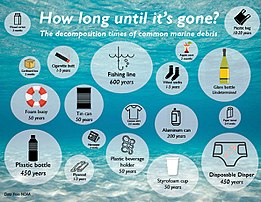 “Even just one person can help to reduce plastic – particularly single-use plastic like straws and grocery bags – although the impact is somewhat limited,” Conner said. “The next step is working with restaurants and locally owned businesses to become ‘ocean-friendly’ certified – we verify that they have given up plastic bags and Styrofoam take-out containers, recycle everything they can, and only provide straws if customers request them.”
“Even just one person can help to reduce plastic – particularly single-use plastic like straws and grocery bags – although the impact is somewhat limited,” Conner said. “The next step is working with restaurants and locally owned businesses to become ‘ocean-friendly’ certified – we verify that they have given up plastic bags and Styrofoam take-out containers, recycle everything they can, and only provide straws if customers request them.”
Restaurants that work with RAP get special training for wait staff to educate customers on the real cost of plastic, he said. Some restaurants may actually save money over the long term. “Life-cycle costs on reusable plates are significantly lower than plastic plates,” he said. Other options – such as compostable cups and clam packs for leftovers – may be slightly more expensive but eco-conscious consumers usually are willing to pay the extra price.
The heavier lift is persuading local governments to regulate the use of single-use plastic, which is why the RAP Program is meeting with the ABM. “Right now, the state of Florida preempts local governments from any ban on plastic bags,” he said. That means that local governments can’t ban plastic bags or Styrofoam, just as they can’t write more stringent rules on fertilizers, guns and cigarettes than already are in place at the state level.

The city of Coral Gables already had a ban on Styrofoam before the preemption went into effect, so they pushed the issue and banned plastic bags as well. The Florida Retail Federation immediately challenged the law, but the courts upheld the city’s right to ban plastic bags within their boundaries. The ruling is currently being appealed.
If Coral Gables wins the appeal, it’s likely to result in an increased interest across the state– 39 municipalities have already signed a non-binding resolution requesting the legal right to ban plastic bags.
Having the RAP campaign speak to the Agency on Bay Management helps to bring local governments up to speed on current – and complex – concerns, said Heather Young, environmental planner for the Tampa Bay Regional Planning Council and staff to the ABM. “With more of our local governments exploring the issue, we can share that information with multiple people at the same time, and perhaps extend an umbrella effect for local governments.”
Conner emphasized that he’s not against the use of plastics, just single-use plastic. “The problem is that plastic bags can’t be recycled – in fact, recyclers hate them because they jam up their equipment,” Conner said. Along with the ubiquitous bags tangled in shrubs and fences along nearly every roadway, a study from the University of Queensland shows that marine debris is the leading cause of sea turtle deaths, he adds.
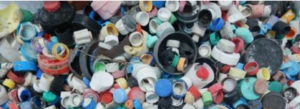
And while change is never easy, it’s not impossible. California banned single-use plastic bags in 2016. A year later, consumers were comfortable with other options – and there was a 70% drop in overall plastic bag litter on the state’s beaches during its annual coastal cleanup day.
“We can all make a difference,” Conner said. “Regulation is likely to be a long road, but everyone can work harder to minimize their impact on the environment.”
RAP will make its presentation to the Agency on Bay Management beginning at 9 a.m. on Thursday, June 14.
How to make a difference:
Of the 30 million tons of plastic waste generated in the US in 2009, only 7 percent was recycled. Plastic is particularly challenging because there are so many different types and they can’t be mixed. Plastic bags, for instance, should never be disposed of with regular recycling because they jam conveyor belts separating items. They should only be disposed of at a grocery store that specifically collects them to be recycled separately.
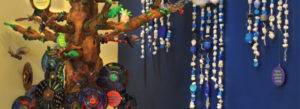
Here are some other tips to reduce plastic:
- Use your own recycled bags for groceries. A single plastic bag can take 1,000 years to degrade — but be sure to clean the bags between use.
- Skip bottled water. In most cases, it’s not any safer or tastier than what comes out of your faucet. Take your own reusable container when ordering from a to-go shop.
- Stop using plastic straws. If you need one, buy a plastic or metal straw that can be cleaned.
- Buy boxes instead of bottles for products like laundry detergent.
- Purchase food like rice and beans in bulk and bring them home in reusable containers.
- When you eat out, bring a reusable container for left-overs instead of a Styrofoam clam that can’t be recycled.
- Avoid using plastic forks, cups or plates — they’re much more expensive than just washing reusable dishes.
- Make your own cleaning supplies with products like baking soda and vinegar and mix them in reusable containers.
- Save egg boxes for people who have chickens — they may even be returned full of farm-fresh eggs.
- Always cut up six-pack containers before disposing of them.
- If you fish, be sure to remove monofilament. Plastic fishing line kills more pelicans than anything else every year in Florida.
It is important for us at Bay Soundings to bring you information you may find interesting or useful. Reference in this article to any specific commercial product or organization name is for informational purposes and does not constitute endorsement, recommendation, or favoring by Bay Soundings. Please scroll through our Pinterest Board, where we’ll be adding information regarding steps you can take to reduce your use of single use plastics.
Originally published June 12, 2018
